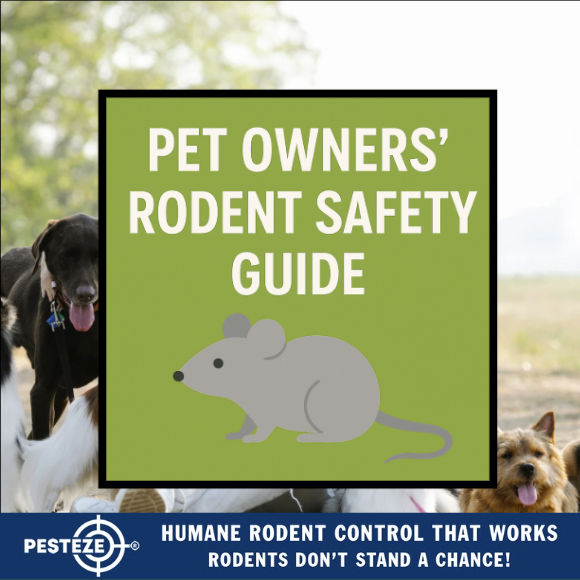PET OWNERS' RODENT SAFETY GUIDE

PET OWNERS' RODENT SAFETY GUIDE
SUMMARY
Rodents pose serious risks to pets by spreading diseases, contaminating food, and causing stress. Learn effective prevention methods to keep your home rodent-free and protect your pets’ health through safe, pet-friendly strategies.
FEATURES
-
Disease Prevention: Reduce risks of leptospirosis, hantavirus, and parasites carried by rodents.
-
Safe Traps & Deterrents: Use humane, pet-friendly solutions that won’t harm cats, dogs, or other animals.
-
Secure Food Storage: Keep pet food sealed to avoid attracting rodents into your home.
-
Sanitation Practices: Regular cleaning helps prevent infestations and protects pet spaces.
-
Outdoor Protection: Safeguard kennels, cages, and yards from rodent activity.
-
Professional Help: Know when to call pest control experts for safe and effective removal.
GUIDE DESCRIPTION
Rodents can present hidden dangers to pets and pet owners alike. Beyond being unwelcome pests, rats and mice carry diseases such as leptospirosis, salmonella, and hantavirus—all of which can transfer through urine, droppings, or contaminated food and water. Pets that explore backyards or come into contact with rodent activity are especially vulnerable. Protecting your pets means not only safeguarding them from direct encounters but also preventing indirect exposure to contaminated environments.
The first step to rodent safety is disease prevention. Regularly check for droppings, gnaw marks, or nesting signs around your home. If rodents are present, take action before your pets can interact with them. Traps and deterrents should always be chosen with care—avoid poisons, as they can endanger both pets and wildlife. Instead, opt for pet-friendly solutions like enclosed snap traps, ultrasonic repellents, or natural deterrents such as peppermint oil, which rodents dislike but pets tolerate.
Food security is another key factor. Open pet food bags are an invitation for rodents to enter. Always store pet food in airtight containers and clean bowls after each meal. Water dishes should also be refreshed daily to minimize contamination risks.
Sanitation goes hand in hand with rodent prevention. A clean environment discourages rodents from nesting. Vacuuming, wiping surfaces, and removing clutter not only protect your pets but also reduce hiding spots for rodents. If your pets spend time outdoors, ensure kennels, cages, and runs are free of gaps or debris where rodents could shelter.
In cases of larger infestations, professional pest control may be necessary. Choose companies experienced in pet-safe rodent management, ensuring your animals are never exposed to harmful chemicals or traps.
By implementing these preventive measures, pet owners can create a healthier, safer environment. Your pets depend on you for protection, and with proactive care, you can shield them from the hidden dangers that rodents bring into the home.
- Aahna Barma


Comments 0